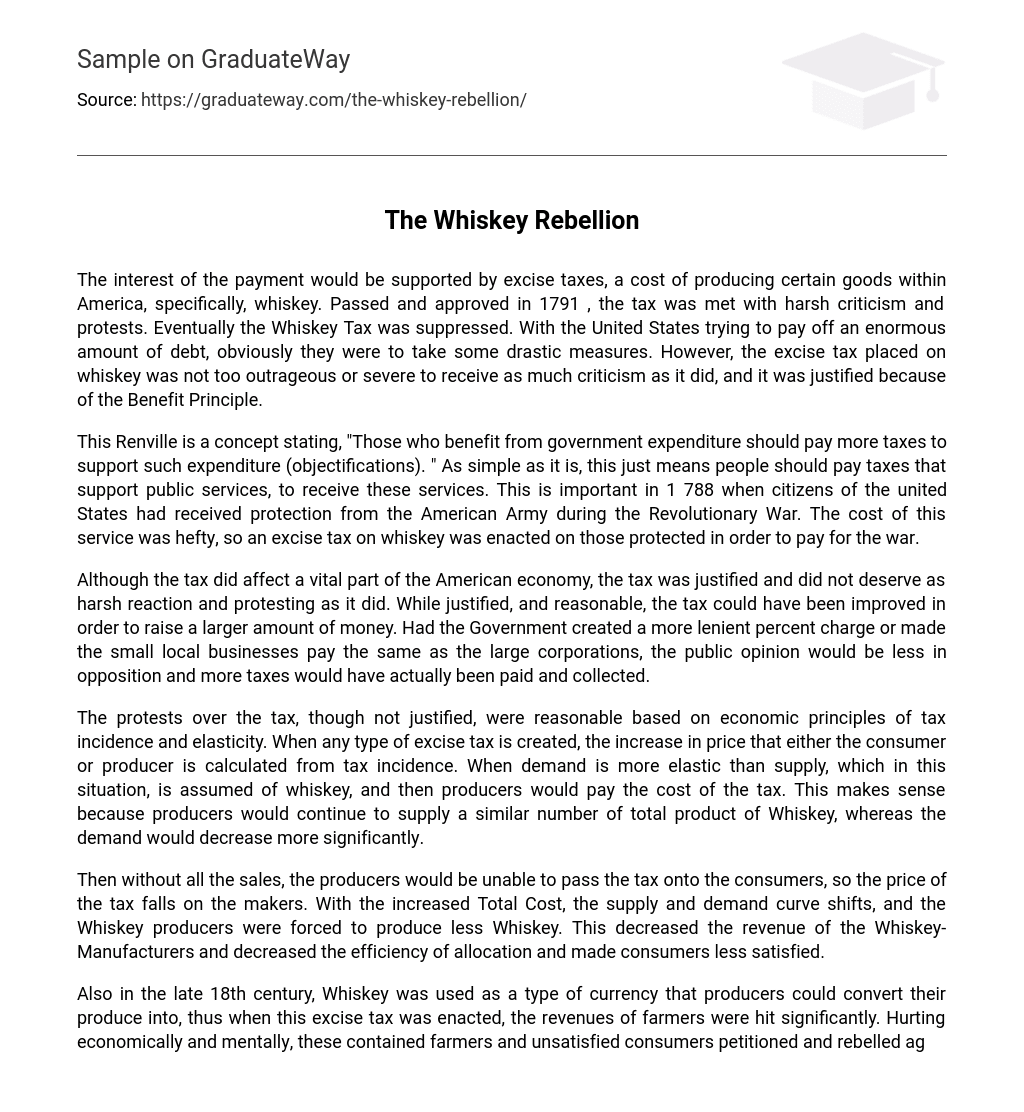The interest of the payment would be supported by excise taxes, a cost of producing certain goods within America, specifically, whiskey. Passed and approved in 1791 , the tax was met with harsh criticism and protests. Eventually the Whiskey Tax was suppressed. With the United States trying to pay off an enormous amount of debt, obviously they were to take some drastic measures. However, the excise tax placed on whiskey was not too outrageous or severe to receive as much criticism as it did, and it was justified because of the Benefit Principle.
This Renville is a concept stating, “Those who benefit from government expenditure should pay more taxes to support such expenditure (objectifications). ” As simple as it is, this just means people should pay taxes that support public services, to receive these services. This is important in 1 788 when citizens of the united States had received protection from the American Army during the Revolutionary War. The cost of this service was hefty, so an excise tax on whiskey was enacted on those protected in order to pay for the war.
Although the tax did affect a vital part of the American economy, the tax was justified and did not deserve as harsh reaction and protesting as it did. While justified, and reasonable, the tax could have been improved in order to raise a larger amount of money. Had the Government created a more lenient percent charge or made the small local businesses pay the same as the large corporations, the public opinion would be less in opposition and more taxes would have actually been paid and collected.
The protests over the tax, though not justified, were reasonable based on economic principles of tax incidence and elasticity. When any type of excise tax is created, the increase in price that either the consumer or producer is calculated from tax incidence. When demand is more elastic than supply, which in this situation, is assumed of whiskey, and then producers would pay the cost of the tax. This makes sense because producers would continue to supply a similar number of total product of Whiskey, whereas the demand would decrease more significantly.
Then without all the sales, the producers would be unable to pass the tax onto the consumers, so the price of the tax falls on the makers. With the increased Total Cost, the supply and demand curve shifts, and the Whiskey producers were forced to produce less Whiskey. This decreased the revenue of the Whiskey-Manufacturers and decreased the efficiency of allocation and made consumers less satisfied.
Also in the late 18th century, Whiskey was used as a type of currency that producers could convert their produce into, thus when this excise tax was enacted, the revenues of farmers were hit significantly. Hurting economically and mentally, these contained farmers and unsatisfied consumers petitioned and rebelled against the tax. With all the opposition and tension, Thomas Jefferson Republican Party eventually repealed the Whiskey tax, which increased the favor of the public opinion of the party and assisted him in becoming president.
Citation: Staff, H. (201 2, January 1). The Whiskey Rebellion I Historical Spotlight. Retrieved September 29, 2014, from https://historiographers. Com/ the-whiskey-rebellion/ 2. Basedontheeconomicsoftaxincidence,discusshowtheintensityofprotestoverim positioned excise tax on whiskey to pay for the national debt incurred during the U. S. Revolutionary War may be related to the supply and demand illegalities of whiskey during the late 1 ass’s.





